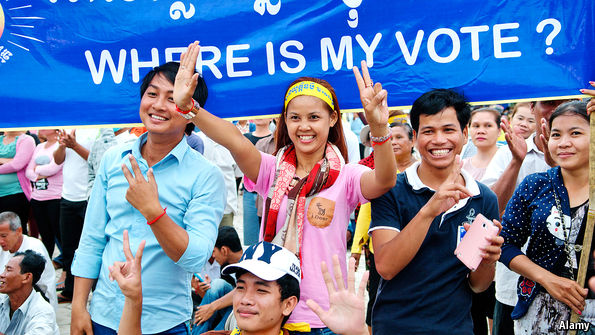Politics in Cambodia
Same old, same old
A young country is saddled with politicians fighting old battles

They cheered Sam Rainsy in 2013
TWO recent college graduates now working for the Cambodia branch of
an NGO, the Asia Foundation, spend their free time in typical
20-something ways: watching films, playing video games and hanging out
with friends. How different were the lives of the parents of the two
graduates when they were the same age as their children are now, under
the dark rule of the Khmer Rouge. Those of Menghun Kaing eked out a
living farming, with no prospect of university, while the father of
Daramongkol Keo spent 18 months in hiding from the brutal regime in the
forest, extinguishing his campfire whenever he heard soldiers
approaching. Like many from that generation, the parents rarely talk
about the past. To survive in those days, Ms Menghun Kaing explains,
people had to “work hard and not say anything, just keep everything to
themselves.”
Today about one-third of Cambodians, and a much higher proportion in
Phnom Penh, the capital, have internet access, mainly via smartphones.
Young Cambodians are coming of age in a still-poor but quickly
developing country: with gross national income of $1,020 per person in
2014, Cambodia is on the threshold of the World Bank’s definition of a
lower-middle-income country. Two-thirds of Cambodians are under 30 and
thus were born long after the Khmer Rouge regime was toppled by
Vietnamese forces and Cambodian rebels in early 1979.
Memories of the horrors of the Khmer Rouge period are fading. Young
people’s concerns are coming to resemble those of the young in any other
country. They worry about the environment: Cambodia is suffering rapid
deforestation, often following illegal land grabs by well-connected
businessmen. They want better education and job prospects. And they want
clean government. Too bad many of their politicians are stale, often
corrupt and mired in battles from the past.
The country’s central political figure, Hun Sen, the 63-year-old head
of the Cambodian People’s Party (CPP), is a former Khmer Rouge
commander turned rebel whose early rise to political power was sponsored
by the Vietnamese. Recently, even Asia’s longest-serving autocrat has
felt the need to woo younger Cambodians by turning more emphatically to
social media. Facebook, which he took to in September, shows him not
only meeting world leaders—last week he was at a summit for South-East
Asian leaders hosted in California by Barack Obama. He is also to be
admired playing with his grandchildren, sitting on the ground in a shell
suit eating noodles, and padding along the beach in a bathrobe and
flip-flops.
But the velvet glove slips off easily. Mr Hun Sen’s government has
locked up opposition politicians on flimsy charges, pursued individuals
through the courts for defamation, blocked the websites of NGOs, and
introduced draft laws on cybercrime and telecommunications that would
criminalise the publication of material “deemed to generate insecurity
[and] instability.” The Corruption Perception Index compiled by a
pressure group, Transparency International (TI), ranks Cambodia 150th
out of 168 countries, and bottom in South-East Asia.
The government has been either unwilling or unable to clean up
Cambodia’s rotten judiciary—the chief problem in curbing corruption,
according to Kol Preap, who heads TI in Cambodia. Nor has it stopped
land grabs and illegal logging that are wreaking havoc in the
countryside.
Leading the opposition to Mr Hun Sen, as he seems to have done for
years, is Sam Rainsy. A cosmopolitan 66-year-old former banker from a
political family, he heads the Cambodian National Rescue Party (CNRP).
His party has often accused Mr Hun Sen of being too close to Vietnam,
Cambodians’ historically overweening neighbour. But to end months of
rioting following an election in 2013 that many believe was rigged, Mr
Sam Rainsy began a curious rapprochement with Mr Hun Sen, having
returned from exile in Paris shortly before.
The pattern has grown familiar: Mr Hun Sen woos his old foe home,
only to threaten him with jail, whereupon Mr Sam Rainsy returns to
Paris. Some think that Mr Sam Rainsy has carved out a rather too
comfortable life for himself as a professional opposition politician.
Not all in the CNRP leadership admire him. And though he retains a
devoted following, some younger activists are turning away.
Disappointment among them set in last November when hundreds of
protesters got ready, at the height of Mr Hun Sen’s fury, to greet Mr
Sam Rainsy at the airport on his return from a trip to East Asia. But he
suddenly cancelled his return and flew to France instead. He says he
did this to avert bloodshed and deny Mr Hun Sen an excuse to crack down.
But younger activists wonder how the opposition can organise around
their central figure if he is absent. Some of the energy has therefore
gone out of the opposition-centred enthusiasm for political change that
was palpable at the time of the last election.
As for ordinary Cambodians, many still tell opinion pollsters that
they approve of their country’s direction and trust that the CPP under
its fatherly leader will implement reforms that will spread prosperity,
lessen inequalities and entrench the rule of law. That may be taking a
lot on faith. Sophal Ear of Occidental College in California says that
the chances of the governing party instilling a proper rule of law “are,
unfortunately, dismal”.


C'est pas du tout trop tard pour Sam Rainsey de faire quelque chose...
ReplyDelete